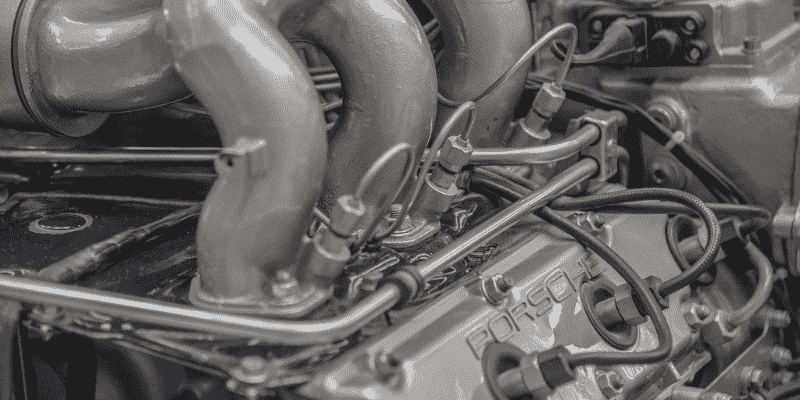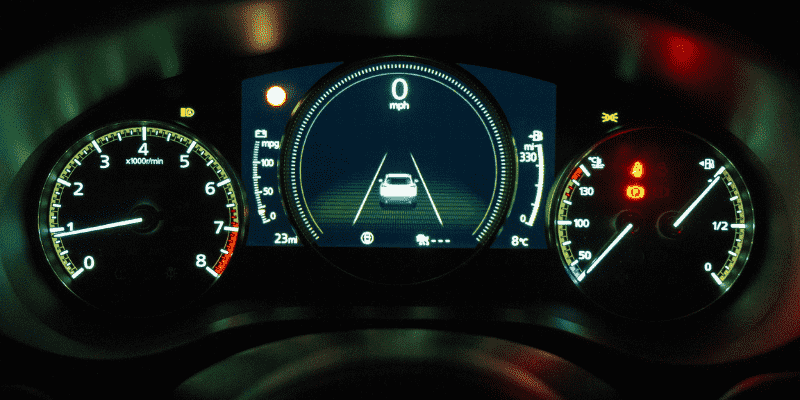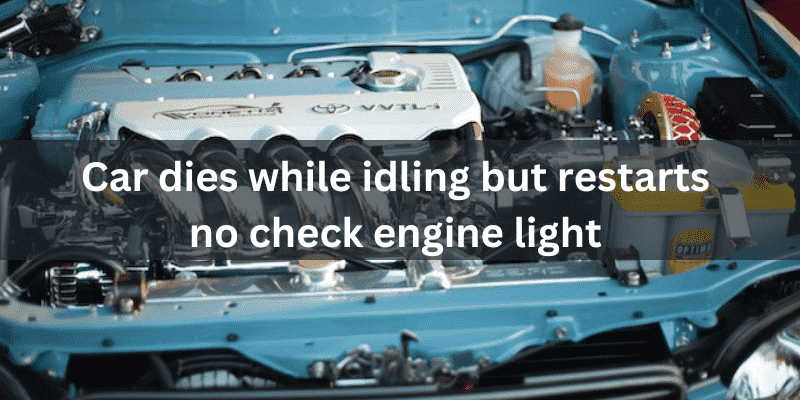An engine that shuts off unexpectedly while your car is stopped is annoying and inconvenient. But don’t worry – in most cases, it’s an easy fix.
This article will explore the most common reasons a Car dies while idling but restarts with no check engine light and provide tips to diagnose and repair the problem. Keep reading to learn why your car dies when idling and how to get it running smoothly again.
Causes of Car dies while idling but restarts no check engine light
A car needs air, fuel, and ignition to run. When one or more of these essential ingredients are disrupted, the engine can stall. Here are some of the most common culprits behind an engine stall:
- Faulty idle air control valve
- Vacuum leak
- Clogged fuel filter
- Faulty fuel pump
- Defective mass airflow sensor
- Bad spark plugs and wires
- Faulty throttle position sensor
- Malfunctioning EGR valve
Problems with the idle air control valve, vacuum leaks, and clogged fuel filters are among the most frequent reasons a car dies at idle. Let’s look at each of these issues in more detail.
1. Faulty Idle Air Control Valve
The idle air control valve regulates the amount of air flowing into the engine while it’s idling. If this valve gets stuck or becomes clogged with carbon buildup, it can disrupt the air-fuel mixture and cause stalling.
Signs of a bad idle air control valve include:
- Car stalling at traffic lights or stop signs
- Engine RPM going up and down
- Check if the engine light is coming on
Fortunately, cleaning or replacing a faulty idle air control valve is relatively inexpensive compared to other repairs. Proper airflow levels can usually be restored with a thorough cleaning or by installing a new valve, which costs around $100 – $300.
2. Vacuum Leaks
Vacuum leaks are a major contributor to idling issues. The engine needs a specific fuel-air mixture to run smoothly. Even a tiny vacuum leak can throw off this balance and may cause a stall.
Some symptoms of a vacuum leak include:
- High engine RPM when idling
- Rough idle
- Check engine light
Start by inspecting all vacuum hoses for cracks, damage, or loose connections. Also, check the intake manifold gaskets. Use a carburetor cleaner or propane spray around hoses and gaskets while the engine is running – if the engine RPM changes, that indicates a leak. Replacing damaged vacuum hoses and intake gaskets will typically solve the issue.
3. Clogged Fuel Filter
The fuel filter screens out dirt, rust, and other contaminants from the fuel before it enters your engine. Over time, residue builds up and starts restricting fuel flow. If your car keeps dying at stop lights or intersections, a blocked fuel filter could be preventing the engine from getting enough fuel when idling.
A clogged fuel filter can also be a reason for your car engine to stall when driving without showing any check engine light.
Warning signs include:
- Car dies when coming to a stop
- Hard starting
- Loss of power
Removing and replacing the fuel filter every 30,000 miles or so keeps it operating at peak efficiency. While waiting at stop lights, a fresh fuel filter ensures your engine gets the steady fuel supply it needs to keep running.
4. Faulty fuel pump
A faulty fuel pump is a common cause for a car to die while idling. The fuel pump’s main function is to deliver fuel from the gas tank to the engine.
If the pump is not working properly, it may not be able to supply enough fuel for the engine to run smoothly at idle. This can result in the car stalling or dying suddenly.
Other symptoms of a faulty fuel pump include difficulty starting the engine, loss of power while driving, and engine sputtering or misfiring. In some cases, the car may start and run fine at higher speeds but die or stall when idling.
If you suspect a faulty fuel pump, it is important to have it inspected and replaced as soon as possible. A professional mechanic can assess the fuel pump’s condition and determine whether it needs to be repaired or replaced. Ignoring the problem can lead to more serious issues and potential breakdowns on the road.
5. Improper Fuel Pressure
When a car dies when idling, it could be due to improper fuel pressure. Fuel pressure is crucial for the engine to run smoothly while the vehicle is at rest.
If the fuel pressure is too low, the engine may not receive enough fuel to maintain idle speed, causing it to stall. This issue can occur due to a variety of reasons, such as a clogged fuel filter, a malfunctioning fuel pump, or a faulty fuel pressure regulator.
Regular maintenance and inspection of the fuel system can help diagnose and resolve this problem. It is recommended to consult a professional mechanic to address issues related to improper fuel pressure and ensure the optimal performance of the vehicle.
6. Mass airflow sensor
A car stalling or dying while idling could potentially be caused by a faulty mass airflow sensor. This sensor is responsible for measuring the amount of air entering the engine, which is crucial for maintaining a proper fuel-to-air ratio.
If the mass airflow sensor is malfunctioning or dirty, it can send inaccurate signals to the engine control unit, leading to a disruption in the fuel system.
As a result, the car may experience a rough idle, misfire, or eventually stall. Regular maintenance and cleaning of the mass airflow sensor can help prevent these issues from occurring.

7. Spark plugs and wires
A car dying while idling could be a sign of a faulty spark plug or wire. Spark plugs play a crucial role in igniting the air and fuel mixture in the combustion chamber, while spark plug wires deliver the spark from the ignition coil to the plugs.
Over time, these components can wear out, resulting in a weak or no spark, leading to engine stalling at idle. It is recommended to regularly inspect and replace worn-out spark plugs and wires to ensure smooth and consistent engine performance.
Faulty spark plugs and worn wires prevent proper ignition timing, making the engine prone to misfiring or stalling.
8. Throttle position sensor
If your car dies when idling, it could be a problem with the throttle position sensor (TPS). The TPS is responsible for monitoring the position of the throttle valve and sending this information to the engine control unit (ECU).
When the TPS becomes faulty or fails, it can disrupt the communication between the throttle and the ECU, leading to stalling of the engine at idle.
In such cases, the throttle may need to be replaced or recalibrated. It is advisable to have a professional mechanic diagnose and fix the issue to ensure the proper functioning of your car.
This relays the throttle opening degree to the computer. When it fails, it interrupts airflow and fuel delivery.
9. EGR valve
When a car dies when idling, it could be due to a malfunctioning Exhaust Gas Recirculation (EGR) valve. The EGR valve is responsible for redirecting a portion of the exhaust gases back into the engine to reduce emissions.
If the valve becomes clogged or stuck in the closed position, it can lead to a buildup of carbon and restrict the airflow, causing the engine to stall. Regular maintenance and cleaning of the EGR valve can help prevent this issue and ensure smooth idling.
If the problem persists, it is advisable to have a professional mechanic inspect and repair the valve.
How to Fix a Car That Dies While Idling
Engine Light Diagnostic
When the check engine light comes on, it can be a cause for concern for any car owner. However, it is important not to panic and instead get the engine diagnosed as soon as possible. A check engine diagnostic is a procedure that involves connecting a diagnostic scan tool to the vehicle’s onboard computer system to read the stored trouble codes.

These codes provide valuable information about the specific issue causing the engine light to come on. By conducting a diagnostic, a trained technician can quickly identify the problem and recommend the necessary repairs to resolve it.
Clean Idle Air Control Valve
Cleaning the idle air control valve is an important maintenance task for vehicles. Over time, dirt and carbon buildup can accumulate on the valve, affecting its performance. A clean idle air control valve ensures proper airflow to the engine, which in turn helps maintain idle smoothness and prevent stalling.
To clean the valve, it is usually removed and sprayed with a specialized cleaner. After cleaning, it is essential to reinstall the valve correctly. Regularly cleaning the idle air control valve can help extend its lifespan and keep the engine running smoothly.
Inspect and Replace Spark Plugs
Inspecting and replacing spark plugs is an essential maintenance task for a well-functioning engine. Spark plugs play a crucial role in igniting the air-fuel mixture in the combustion chamber, ensuring efficient combustion and optimal engine performance.
Over time, spark plugs can become worn or fouled, leading to poor engine performance, misfires, or even difficulty starting the engine. Regularly inspecting and replacing spark plugs can help maintain fuel efficiency, improve engine power, and prevent potential engine problems in the long run.
Inspect Fuel Pump
A faulty fuel pump could be a possible reason if a car dies when idling. The fuel pump is responsible for supplying fuel to the engine, so if it is not functioning properly, the engine may not receive enough fuel to stay running at idle.
Checking the fuel pump involves a few steps, such as listening for a humming sound when the ignition is turned on, checking the fuel pressure, and inspecting the fuel filter. If any issues are found, it may be necessary to replace the fuel pump to resolve the problem.
Check Fuel Filter
The fuel filter’s purpose is to trap any dirt or debris that may be present in the fuel before it reaches the engine. Over time, these particles can accumulate and block the flow of fuel.
To fix this issue, you can try replacing the fuel filter. It is a relatively simple and inexpensive fix that can help improve the performance and reliability of your vehicle.
Search for Vacuum Leaks
If your car dies while idling, one possible cause could be vacuum leaks. These leaks can cause an imbalance in your car’s air-to-fuel ratio, leading to engine stalling. To fix this issue, you can start by checking for any visible signs of vacuum leaks, such as cracked or damaged hoses.
Additionally, you can use a smoke machine or propane torch to locate any hidden leaks. Once identified, you can replace or repair the affected vacuum hoses to ensure smooth idling and prevent your car from stalling.
Address Faulty Exhaust Systems
If your car dies while idling, the issue could be a faulty exhaust system. The exhaust system plays a crucial role in reducing emissions and maintaining engine temperature and performance. A leak in the exhaust system can disrupt the engine’s ability to properly idle, resulting in the form of the engine shutting.
To fix this issue, you should inspect the exhaust system for any leaks or damage. If you find any issues, such as cracks or holes, it is recommended to have a professional repair or replace the faulty components to ensure the proper functioning of the exhaust system and prevent further damage to your car.
What Should You Do if the Car Dies While Driving?
A car dying while cruising down the highway creates a dangerous situation. If the engine cuts out, you’ll lose power steering and brake support. Try these actions if the car stalls while driving:
- Put the car in neutral and pull over when safe to do so
- Restart the car to regain control of the steering and brakes
- Have the car towed to avoid a breakdown in an unsafe location
Repeated stalling while driving indicates a serious problem requiring immediate inspection by a mechanic. Avoid driving the car until the specific issue can be diagnosed and resolved.
Key Takeaways on Fixing a Car That Stalls at Idle
To recap, follow this game plan if your car keeps dying when stopped:
- Scan for diagnostic trouble codes
- Inspect vacuum hoses, fuel filters, sensors
- Test fuel pump pressure and volume
- Change bad spark plugs and wires
- Clean the IAC valve or replace it if needed
- Confirm repair successful with a test drive
Finding the root cause takes patience, but methodically testing components will uncover the glitch. Addressing small repairs like a blocked fuel filter or leaky hose can often get your engine running smoothly again and prevent those annoying stalls.
With a few tools and affordable replacement parts, you can troubleshoot and fix a car that keeps dying while idling. Or rely on a professional mechanic for more complex issues. Either way, a smooth idling engine will have you back on the road and moving again.
Conclusion
If your car dies while idling but restarts with no check engine light, there could be several potential causes. One possibility is that there is a problem with the fuel system, such as a clogged fuel filter or a malfunctioning fuel pump.
Another possibility is an issue with the ignition system, such as a faulty ignition coil or a worn-out spark plug. Additionally, a problem with the idle control valve or a vacuum leak could also be causing the stalling. It is recommended to have a professional mechanic diagnose and repair the issue to prevent any further damage to the vehicle.

Hi, Michael Williams here. I have always loved everything with an engine. After earning my degree in automotive engineering, I spent 5 years testing vehicles for a major manufacturer in Illinois. Now I am using my technical skills to review the latest models online and help others troubleshoot their engine problems with effective solutions.
